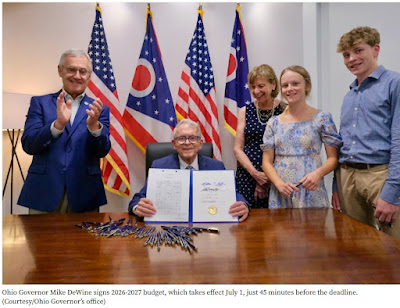COLUMBUS — Gov. Mike DeWine late Monday signed off on $600 million in funding to help the owners of the Cleveland Browns build a new domed stadium in neighboring Brook Park, one of the biggest ticket items in the state budget passed by fellow Republicans.
He also put his signature to what has become the centerpiece of the budget — a $1 billion-plus tax cut for those earning over $100,000 a year as Ohio becomes the 15th state with a flat income tax.
But before signing House Bill 96 into law, the governor used his line-item veto authority 67 times. Mr. DeWine plans a news conference later Tuesday to further discuss his decisions.
He struck a plan to force school districts to lower property tax bills if their budgetary reserves are equal to more than 40 percent of their operating budgets. He also restored the 90-year-old sales tax exemptions for newspapers and printing operations that the budget would have eliminated.
He also struck a provision forcing public libraries to segregate materials dealing with sexual orientation and gender so that they can’t be accessed by minors. This would have occurred at the same time that the budget is eliminating their guaranteed slice of state revenues, something the governor could not reverse.
“This budget builds upon my commitment to make Ohio the best place for everyone to live their version of the American Dream,” Mr. DeWine said. “It prioritizes our children, empowers our work force, and strengthens our communities. We are investing in the people of Ohio, not just today, but for generations to come.”
The idea of using public funds to help the Haslam Sports Group build the $2.4 billion facility, even as Cleveland has sued to try to keep the stadium in the city, has proven controversial from the start.
Democrats and Republicans alike had called for the governor to wield his line-item veto authority to remove the language, but the governor let it stand, his office confirmed.
When House Bill 96 left the General Assembly last week, the plan totaled just over $200 billion over the biennium, counting both state and federal dollars.
Despite his arguments that Ohio’s income tax was already competitive and the state needed to invest in its future, Mr. DeWine kept the provision that has Ohio joining neighbors Michigan, Indiana, Pennsylvania, and Kentucky as flat tax states.
Ohio’s ultimate flat rate of 2.75 percent by next year would be the lowest among all of them.
The elimination of the top income bracket would lead to a tax cut for those earning more than $100,000, as that rate drops from 3.5 percent to 3.125 percent this year and 2.75 percent next year.
Those earning between $26,050 and $100,000 will not see a tax cut, while those earning less would still owe no tax.
While the governor was able to strike provisions, he couldn’t add language or substitute numbers.
Not a single Democrat supported the budget.
“Republicans just made Vivek Ramaswamy even richer,” Ohio Democratic Party Chairman Kathleen Clyde said. “Instead of supporting Ohio families, the Republican legislature passed a budget that only helps their billionaire friends and special interests.
“Ohioans deserve better, and Republicans will have to answer for this disastrous budget in the next election cycle,” she said.
A handful of Republicans joined them in opposition, in some cases because of their opposition to the stadium funding.
The idea of using public funds for the project was never the problem among the big three at the budget negotiation table. Mr. DeWine, the House, and the Senate all supported the concept. It was just a matter of how to go about it.
The governor wanted to raise the tax on sports betting operators to fuel a fund that would benefit this and similar sports stadium and arena projects as well as youth recreation. He argued that the state shouldn’t keep using taxpayer-backed borrowing to pay for such projects.
The House, in turn, nixed that idea and promptly proposed to do exactly that with a 30-year bond package.
Ultimately, the budget conference committee went with the Senate’s idea of taking $1.7 billion out of $4.8 billion in forgotten bank accounts, rent security and utility deposits, uncashed checks, and other unclaimed funds placed with the state for safekeeping until the owners come calling.
Of the $1.7 billion, the plan immediately funds the Browns stadium and sets aside $400 million more for others expected to come calling, such as the Cincinnati Bengals for renovations of their existing riverfront stadium.
Also surviving is language changing the so-called “Modell Law,” created after Art Modell moved the Browns franchise to Baltimore 25 years ago, leaving behind just the team’s name.
The law now states that past taxpayer investment could be clawed back when a team move occurs only when it’s an out-of-state move. That undercuts a Cleveland lawsuit trying to block the move.
Among provisions vetoed were:
● An expansion of school vouchers through creation of Education Savings Accounts to pay for tuition and other school expenses at private schools.
● A prohibition on H2Ohio funds being used to acquire land and easements, something Mr. DeWine noted is needed for water quality projects like wetland development.
● An elimination of replacement levies and certain other types of property tax levies.
● A prohibition on using local government power of eminent domain to obtain property for recreational trails.
● A repeal of current efforts to keep children under the age of 4 continuously enrolled in Medicaid.
● A requirement that local school board members appear on the ballot with partisan labels attached.
This article may be read here.


